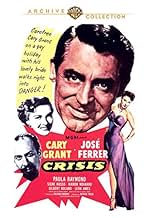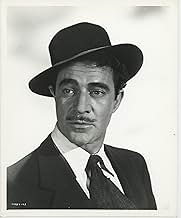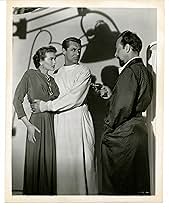IMDb RATING
6.7/10
2K
YOUR RATING
While on vacation in a Latin American country, an American neurosurgeon and his wife become tangled in a revolutionary uprising against a tyrannical dictator.While on vacation in a Latin American country, an American neurosurgeon and his wife become tangled in a revolutionary uprising against a tyrannical dictator.While on vacation in a Latin American country, an American neurosurgeon and his wife become tangled in a revolutionary uprising against a tyrannical dictator.
- Awards
- 1 win total
José Ferrer
- Raoul Farrago
- (as Jose Ferrer)
Lillian Adams
- Nurse
- (uncredited)
Carlos Barbe
- Friend of Farrago
- (uncredited)
Orlando Beltran
- Doctor's Assistant
- (uncredited)
Audrey Betz
- Servant
- (uncredited)
George Brady
- Student
- (uncredited)
Robert Cabal
- Very Young Man
- (uncredited)
Andy Carillo
- Man at Table
- (uncredited)
Bridget Carr
- Guest
- (uncredited)
Teresa Celli
- Rosa Aldana
- (uncredited)
Carlos Conde
- Man
- (uncredited)
Rita Conde
- Pretty Woman
- (uncredited)
- Director
- Writers
- All cast & crew
- Production, box office & more at IMDbPro
Featured reviews
Even someone who's been keeping track of old movies for many years can be forgiven if this one slipped under the radar. Surgeon Cary Grant and his wife are vacationing in a South- or Central-American paradise when they are abducted by government forces. Seems the country's dictator (Jose Ferrar) has a brain tumor but is afraid to leave the country due to revolutionary activity. Grant is pressured into performing the operation. Only problem is, the guerrillas have captured his wife, threatening to kill her if Ferrar survives the operation. But the letter informing him of this never reaches Grant.... Supporting cast includes Leon Ames, Ramon Navarro (Ben-Hur of the silent era) and Signe Hasso as Ferrar's wife, an Evita Peron clone. This is a tense and often intelligent drama (and slightly out of Grant's usual debonair range) that doesn't merit the obscurity it seems to be buried in.
"Crisis" is a study in how a strong supporting cast can make a movie complete. While Grant and Ferrer give powerful performances, they are enhanced by even better performances by Signe Hasso and Ramon Navarro. The latter two, with subtle, understated characterizations, round out a thoughtful script and cast. The story is compelling -- medical/ethical conflict, interwoven with a political drama which doesn't attempt to sway. It does provide a backdrop which doesn't interfere but enhances.
Cary Grant stars as a famous neurosurgeon who is vacationing in a South American country with his new bride. The pair are subject to a "friendly abduction" when the current president of that country, Raoul Farrago (Jose Ferrer), learns of his presence. You see, the president has a brain tumor, and due to the fact that his country is on the verge of civil war, he dares not travel to another country for the operation he needs to save his life.
Farrago is a tyrant who claims that he must be so because democracy would never work in his country. His people are illiterate children, he says, and wouldn't know what to do with freedom if they had it. However, being a national "father image" doesn't prevent the president from stealing everything in the country that isn't nailed down. The president's wife does a great job of emulating Evita Peron before much was really known about her. Then there is Gilbert Roland as the leader of the opposition. He wants to make his people free, as long as he gets to be the new dictator. Roland does a great job with this role. How far he has progressed here since his early days as an actor at the dawn of sound.
So the question is - does Grant owe a service to the dictator by saving his life with a delicate operation only so that patient can go on being a killer and a thief, or would the death of this tyrant better serve mankind? If you throw the safety of his wife into the balance - what decision does the doctor make?
Farrago is a tyrant who claims that he must be so because democracy would never work in his country. His people are illiterate children, he says, and wouldn't know what to do with freedom if they had it. However, being a national "father image" doesn't prevent the president from stealing everything in the country that isn't nailed down. The president's wife does a great job of emulating Evita Peron before much was really known about her. Then there is Gilbert Roland as the leader of the opposition. He wants to make his people free, as long as he gets to be the new dictator. Roland does a great job with this role. How far he has progressed here since his early days as an actor at the dawn of sound.
So the question is - does Grant owe a service to the dictator by saving his life with a delicate operation only so that patient can go on being a killer and a thief, or would the death of this tyrant better serve mankind? If you throw the safety of his wife into the balance - what decision does the doctor make?
Cary Grant is a noted surgeon traveling with his wife (Paula Raymond) in a Latin American country when there's a "Crisis."
This 1950 black and white film also stars Jose Ferrer, Leon Ames, Ramon Novarro, and Gilbert Roland. Grant, as Dr. Ferguson, and his wife are trying to leave the country due to political unrest when they are kidnapped and brought to the home of the country's dictator, Raoul Farrago (Ferrer).
There, they learn from his wife (Signe Hasso) that the leader is dying of a brain tumor, and options for an operation are few as no one wants him to live. Ferguson agrees on certain conditions.
Ultimately, his wife is involved in a riot, and he sends her home. It isn't until the surgery is over that he learns that certain things have been kept from him.
This is actually a very good and underrated film, not the usual Cary Grant type of role or movie, which in itself should have sparked some interest when it was released.
People know the handsome Grant and his debonair persona, his gift for physical comedy and the way he has with a line - but it's nice to remember occasionally that underneath all that star power and tailored suits there's a fine actor.
Here he plays a man who makes a commitment to a patient he plainly doesn't like, and he has to fight to control his emotions. His anger over the situation makes this difficult.
Ferrer is terrific as a violent man who thinks of his people as dumb children as he feathers his own nest with money that rightfully belongs to them. As his Evita-like wife, Signe Hasso has a chance to show her capabilities, and she's excellent - charming on the surface, worried about her husband, and hard as nails underneath.
Hasso was a wonderful Swedish actress often relegated to B movies or to small roles in A films. Eventually she turned to theater and television. Here we see, had the roles been there for her, what a find she truly was.
It's always great to see old-timers Gilbert Roland and Ramon Novarro, the latter as Colonel Dragon, and the former as a revolutionary who wants Grant to kill Farrago on the operating table. Actually he's no better than Farrago, and Ferguson gets a bird's eye look at oppression politics.
A very good film; worth seeing for Grant, Ferrer and Hasso.
This 1950 black and white film also stars Jose Ferrer, Leon Ames, Ramon Novarro, and Gilbert Roland. Grant, as Dr. Ferguson, and his wife are trying to leave the country due to political unrest when they are kidnapped and brought to the home of the country's dictator, Raoul Farrago (Ferrer).
There, they learn from his wife (Signe Hasso) that the leader is dying of a brain tumor, and options for an operation are few as no one wants him to live. Ferguson agrees on certain conditions.
Ultimately, his wife is involved in a riot, and he sends her home. It isn't until the surgery is over that he learns that certain things have been kept from him.
This is actually a very good and underrated film, not the usual Cary Grant type of role or movie, which in itself should have sparked some interest when it was released.
People know the handsome Grant and his debonair persona, his gift for physical comedy and the way he has with a line - but it's nice to remember occasionally that underneath all that star power and tailored suits there's a fine actor.
Here he plays a man who makes a commitment to a patient he plainly doesn't like, and he has to fight to control his emotions. His anger over the situation makes this difficult.
Ferrer is terrific as a violent man who thinks of his people as dumb children as he feathers his own nest with money that rightfully belongs to them. As his Evita-like wife, Signe Hasso has a chance to show her capabilities, and she's excellent - charming on the surface, worried about her husband, and hard as nails underneath.
Hasso was a wonderful Swedish actress often relegated to B movies or to small roles in A films. Eventually she turned to theater and television. Here we see, had the roles been there for her, what a find she truly was.
It's always great to see old-timers Gilbert Roland and Ramon Novarro, the latter as Colonel Dragon, and the former as a revolutionary who wants Grant to kill Farrago on the operating table. Actually he's no better than Farrago, and Ferguson gets a bird's eye look at oppression politics.
A very good film; worth seeing for Grant, Ferrer and Hasso.
Crisis represents yet another attempt by Cary Grant to break away from his light leading man image and do something with more drama. His last attempt was None But the Lonely Heart which got great critical notices, an Oscar nomination for him and died at the box office. The public just didn't want to see him in stuff like Crisis.
The film is one of a very few non-musical productions by Arthur Freed at MGM. And the original story was intended for Spencer Tracy who was to be a neurosurgeon traveling in Latin America with a 10 year old daughter. The powers that be decided a little romance was needed so Tracy was substituted by Grant and he was given a wife played by Paula Raymond instead of a daughter.
He's a neurosurgeon and when the powers that be discover him in their country he's brought to the presidential palace to operate on Peron like dictator Jose Ferrer. Then the rebels capture Paula Raymond and Grant's got a dilemma.
Signe Hasso who was cast in the role of the first lady bears more than a passing resemblance to Eva Peron does the best job in the film. Cast in Latino parts are such Hollywood Latinos as Raymond Novarro, Gilbert Roland, Antonio Moreno, and Pedro deCordoba. All perform well.
Crisis marked Richard Brooks's directorial debut and he wrote the script as well. Unfortunately the same thing happened here as did to None But the Lonely Heart. Great reviews and it lost money. Brooks was established as a director though.
The film is one of a very few non-musical productions by Arthur Freed at MGM. And the original story was intended for Spencer Tracy who was to be a neurosurgeon traveling in Latin America with a 10 year old daughter. The powers that be decided a little romance was needed so Tracy was substituted by Grant and he was given a wife played by Paula Raymond instead of a daughter.
He's a neurosurgeon and when the powers that be discover him in their country he's brought to the presidential palace to operate on Peron like dictator Jose Ferrer. Then the rebels capture Paula Raymond and Grant's got a dilemma.
Signe Hasso who was cast in the role of the first lady bears more than a passing resemblance to Eva Peron does the best job in the film. Cast in Latino parts are such Hollywood Latinos as Raymond Novarro, Gilbert Roland, Antonio Moreno, and Pedro deCordoba. All perform well.
Crisis marked Richard Brooks's directorial debut and he wrote the script as well. Unfortunately the same thing happened here as did to None But the Lonely Heart. Great reviews and it lost money. Brooks was established as a director though.
Did you know
- TriviaOriginally banned in Mexico, Central and South America.
- GoofsThe doctor announces his fee is ten percent of the patient's income, but does not say whether this means monthly, annual or some other period.
- Quotes
Raoul Farrago: At least permit me to thank you. You have done a great service not only to me but to the people of my country.
Dr. Eugene Norland Ferguson: I only saved your life I didn't vote for you.
Raoul Farrago: Neither did they.
[smiling]
- Crazy creditsPROLOGUE: "The time is now. The scene of the action is fictitious, but the forces at play in this story are not fictitious."
- Alternate versionsAlso available in a computer colorized version.
- ConnectionsReferenced in Secret Publicity - Forbes Taylor Remembers the Making of State Secret (2021)
- How long is Crisis?Powered by Alexa
Details
Box office
- Budget
- $1,616,455 (estimated)
- Runtime
- 1h 35m(95 min)
- Color
- Aspect ratio
- 1.37 : 1
Contribute to this page
Suggest an edit or add missing content

































